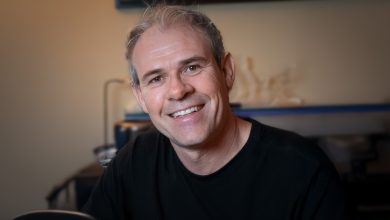TWiP #246 – Pinterest’s Interest
[google1]
This week on TWiP we're talking about Pinterest, copyright violations, serial killers, and dead rabbits. Plus Frederick sits down for an interview with photographer Dan Ablan.
Hosts: Frederick Van Johnson, Derrick Story, and Steve Simon
Episode Overview:
This week we're talking about Pinterest. Is it a good thing or a bad thing for photographers?
Also, the Daily Mirror steals a model's image to illustrate a story about serial killers, and a German photographer accidentally kills the subject he was sent to photograph.
Frederick also sits down for an interview with photographer Dan Ablan to discuss running a brick and mortar studio.
Derrick Story and Steve Simon join Frederick Van Johnson to discuss these topics and more on this week's episode of TWiP.
Steve Simon: Gulf Photo Plus in Dubai
Derrick Story: Lowepro Event Messenger 250
Frederick Van Johnson: Moom
Please Support our Sponsors:
Squarepace.com
Squarespace.com, the fast and easy way to create a high-quality website or blog. For a free trial and 30% off your new account for three months, go to Squarespace.com, and use offer code TWIP3.
Connect with Our Hosts & Guests:
Dan Ablan: www.ablangallery.com or ww.agadigital.com or www.twitter.com/danablan
Steve Simon: www.twitter.com/stevesimon or www.thepassionatephotographer.com
Derrick Story: www.twitter.com/derrick_story or www.thedigitalstory.com or Google+
Frederick Van Johnson: www.mediabytes.com or www.twitter.com/frederickvan or Google+
Credits:
Pre-production by: Bruce Clarke
Post production by: Suzanne Llewellyn
Bandwidth provided by: Cachefly
Intro Music by Scott Cannizzaro







The GPP Shoot Out posted today at https://vimeo.com/39140805
It lives up to Steve’s comments.
In no way shape or form am I looking to downplay copyright infringement or the sharing and stealing of images without a photographers permission. Simply stated, it is wrong and it is a problem. However, I think that photographers are viewing social media all wrong.
A lot of photographers are taking measures to resist and make it harder for people to find and share their images on social networks for fear of an image “getting out into the wild” without their permission. The reality is, the way people interact with the web today has changed from the way they used the web 5 years ago. Not everyone is navigating to websites to find interesting images and content they enjoy. With so many sites and tools that do a fantastic job of curating interesting content, gone are the days where we visit individual websites for updates. Instead, we log on to that one site to see all of our content, from our favorite sites, in one stream. We sift through that which appears and visit only the pages of the content we find intriguing. It saves time and weeds out all of the unnecessary, uninteresting, content.
By making your content harder to find by way of these sites, you are committing yourself to stubborn ways. It WILL NOT change how people use the web and it will not encourage folks to visit your website. In fact, it will do the exact opposite. People will still use websites like Pinterest to find cool images, only, your images will no longer show up on anyone’s boards or feeds. And guess what? Those people who used to pin your images because it was once interesting and easily accessible, will not navigate away from Pinterest to view your images. They will simply forget about you and your work. You are “swimming upstream.”
It is much easier to change yourself, your actions, and the way you interact with your audiences through social media than it is to change an entire culture of internet trends. Facebook, Twitter and Pinterest are indicative of the way social media will be shifting for years to come. If you refuse to adapt, you can absolutely count on less traffic to your website. You may be a fantastic photographer but if you make it hard for people to find your images within their daily workflow, they will simply stop looking for you.
PS. – As far as I know, if you are pinning an image from within the webpage it originated from, by default it links back to that page. So if an image is pinned from your website, it will link back to YOUR website.
AMEN! I agree 100% and wrote something similar (not as well written and with less words) on TWiP’s G+ page. I really think the TWiP guys need a guest with social networking knowledge, so the listeners can get to hear how real web interaction works today. I think you would be a great guest Aaron 🙂 They should invite to to chat about these things.
Thank you for the vote of confidence. However, I am by no means equipped to speak as a “guru” on social media… Though I would certainly LOVE to “round-table” with the folks at TWIP on this subject. I am interested in reading the article you have written. Can you provide a link? It may be helpful for others as well.
What I wrote on the G+ page:
I think it’s a storm in a glass of water, when it comes to Pinterest. Kirsten Kowalski’s points are valid, but things have changed a lot the last couple of years. Maybe not in the laws, but so many photographers now understand the benefit of sharing their images in social media. I have heard NO mention of Tumblr, the very popular site that have done the same thing for years. Their terms might be different than Pinterest, but probably not much.
Great comment. I am a little late to the game, just got a chance to listen to this podcast last week and was surprised by the Pinterest negativity. Esp. since it really sounded like no one talking about the subject had actually used Pinterest. As with any medium like this, there are things to be wary of and pay attention to when it comes to your rights, etc, but as you said, Pinterest links back to the original site the image was found on. The only way it would not link back to you or some site you contributed to is if your material is out on the “interwebs” in some other fashion… and if that is the case you may have issues other than Pinterest.
Seems to be a private video that (even logged in) doesn’t let me view it 🙁
Re the heavy pipe welder who wanted to take photos : I’m on construction all the time and was surprised no-one mentioned the Canon G12 ( surprised because Frederick has a G9 )! The low light performance is excellent and the fully articulated screen means the screen can face you when you’re shooting yourself. That means on self timer you can keep an eye on the exposure, focus and composition.
I might have missed this, but it sounded like Frederick asked the question, “What is the reason for a watermark, if people can just crop it out?” (or something similar). And it didn’t sound like anyone had a really good reason of why it is beneficial.
But I know I heard this same discussion quite a few episodes ago (and I mean quite a few), where they talked about how if someone intentionally crops out your watermark, there is a statute in the Copyright act that addresses this and the fines for it.
I found this link that talks about it. It’s from 2007, so I am not sure how updated this is, but here it is. If anyone has any further information, it’d be interesting to see.
https://www.photoattorney.com/2007/07/watermarks-can-be-music-to-your-ears.html